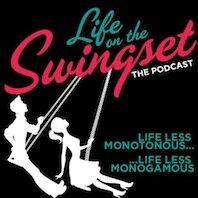If it wasn’t for the hoards of people pouring in and out of the front doors of Abercrombie & Fitch on Burlington Gardens, clutching their monochrome paper bags in their gleeful hands, the building would have appeared fairly inconspicuous. Grand, beige stone, it fit in well with the master tailors whose shops looked almost closed just around the corner. But the young adults on the street outside gave the place away.
My curiosity piqued, I followed my friends through the double doors and even smirked a little as two beautiful young things greeted us. Too slight to be security, the entirety of their job was, apparently, to welcome the thousands of consumers who made it through those doors each day. I lowered my eyes, uncomfortable with the smiles they shone at us. Directly ahead was that ever famous torso, twenty feet high, evidently all the store needed in the way of logos. I even laughed as I noticed, standing before this giant image, a young man – perhaps my own age – the front of his grey hoody and red checkered shirt open to display his own ripped chest and stomach. At his side, safe in the casually slung crescent of his arm, was a plain looking girl, grinning at the camera whilst he smoldered above her.
Whether it was at this moment itself, or upon recollecting it as I was sucked into the heaving innards of the shop, I’m not sure: but when I reflect upon the experience, I see him, and my stomach turns.
It is one thing to stand before a camera in a white studio, or even to stride along the catwalk, visible but removed from the crowds; it is quite another to make yourself a mannequin for the titillation of tourists and consumers; to be touched like plastic, and photographed in no more than two dimensions. Looking at him, twenty minutes later, as I ducked out of the shop, desperate for the cold light of day and deeply inhaled nicotine, I wondered what that kind of objectification does to a person.
Of course, I have no doubt this role was one he had consented to. I don’t think it takes a great deal of persuading in order to get a model to pick up that kind of exposure. And perhaps it is incomparable, but thinking back I couldn’t help but contrast his situation with that of submissives who crave degradation and objectification. Yet, perhaps it is a poignant remark: our society is happy to let this man stand in the doorway, an object for the aesthetic pleasure of shoppers. How much thought do you think he put into this decision? As he stood there in the foyer, did he feel his smile become less sincere? Did his cheeks hurt? Did even one of the women or men who clamoured to be at his side wonder what his name was? Meanwhile, forced into the cupboard under the stairs, bound and gagged, any intelligent submissive has thought of this moment for a long time. He or she has pondered the implications, negotiated with a partner, measured to fit him or herself into that space. And, of course, there is the want. However, this latter image is one far beyond the comprehension, or the desire for comprehension, of most people.
But this is not an essay about BDSM. Even if this previous comparison does not stand up; even if the model in the foyer had dreamed of this moment, longed for it, begged for it, his customers didn’t know that. Far more important is the matter of us; of the consumers.
As I plunged into the low-lit, club-like atmosphere of the store, my ears filled with pounding bass, I observed the customers moving with almost desperate need. No one waited patiently; nor did they smile contentment. I saw only searching eyes, ravaging the shelves and the human mannequins: all carbon copies with only minutely differing palettes adorning the establishment. I saw kinder eyes in the face of my abuser. Some were placed strategically to look like assistants; others hovered at the top of the stairs, in doorways and alcoves, just to smile and ensure that you, the customer, were never left in any doubt of their aesthetic happiness. This disturbed me, firstly, knowing that never in a million years could I stand in this place and be considered perfect enough to represent it; not that I would ever want to, but that kind of discrimination fills me with fear for every girl or boy who feels their own inconsequence in the world. In the second instance I was struck by how revolting it is to use human beings as advertising. I wondered how these jobs were publicised, how the men and women were picked. What has happened to us that our friends and family and lovers may aspire to this kind of servitude?
I was wrong, at 14, when the highlight of channel 4’s Sunday morning line-up was The OC, a show about rich teenagers, troubled over society events and drug dealers. I naïvely believed that people watched it for the ridiculous, unintended humour of the action. Perhaps I wanted to believe that people were smart enough to remove themselves from that fantasy. But I was wrong. The vision sparked a hunger; a need for this shiny, unrealistic lifestyle. And now, here, in the middle of a city that has my heart, this disgusting desperation has been commodified. Now, for £50 you can buy a cardigan that will make you feel, in any situation, that you come from this place. That you are a part of it. But I have no doubt it will also leave you with a sense of inadequacy. Which is, of course, the saddest part of all: I don’t want to believe that my fellow man is sitting with a sense of futility all because he can’t be a handpicked, dehumanised mannequin. I so deeply want to believe in more than this; to look around and see faces satisfied through hard work and genuine emotion.
I would rather see a woman weeping over the death of her husband than witness the dissatisfaction of girl who’s shorts don’t quite conjure the universe she briefly inhabited as she handed over her hard earned cash. This place made me crave pain; not in the desirous way of a masochist, but as a girl, desperate to experience something real and present. I wanted to watch bruises bloom around my eye because someone had felt enough to do that to me.
Perhaps this seems dramatic; one company is representing a fantasy people will pay for; so what? But I am not so concerned with the existence of this particular place as I am with the demand for it. What does it say about who we are? We come from a species that has been to the moon. We have fought great and terrible wars over religion and truth; however horrific warfare may be, someone felt passionately enough to stake his life on his beliefs. We have pondered the creations of great men, and wept over the decisions of maniacs. And now, in a century where common people hold more technology and power in the palms of their hands than was present on that first space shuttle, we are pushing each other out of the way in the hope of acquiring nothing more than a word, sewn by slave fingers onto bright coloured acrylic.
Maybe I am being dramatic, but when I gasped free, stepping out onto the grey pavement, I was stuck by only one thought: this is the place love and morality come to die.
And it is not a place that should exist on earth.


























Very interesting post and it reminds me of thoughts that my husband had on a trip to China where he witnessed the place “engineers came to die”. He made a vow to himself that day.
I’ll have to ask him about that; sounds very interesting.